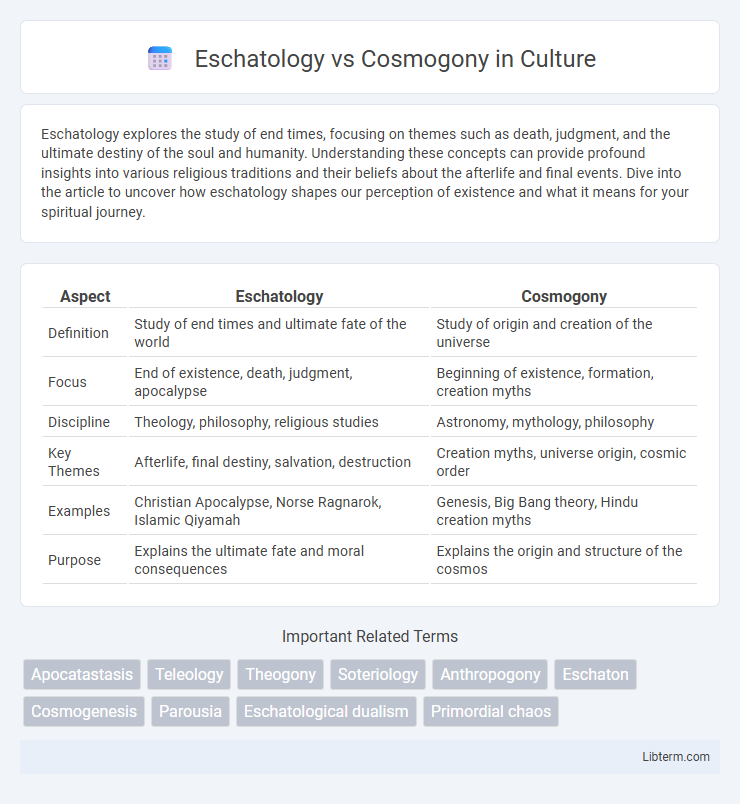Eschatology explores the study of end times, focusing on themes such as death, judgment, and the ultimate destiny of the soul and humanity. Understanding these concepts can provide profound insights into various religious traditions and their beliefs about the afterlife and final events. Dive into the article to uncover how eschatology shapes our perception of existence and what it means for your spiritual journey.
Table of Comparison
| Aspect | Eschatology | Cosmogony |
|---|---|---|
| Definition | Study of end times and ultimate fate of the world | Study of origin and creation of the universe |
| Focus | End of existence, death, judgment, apocalypse | Beginning of existence, formation, creation myths |
| Discipline | Theology, philosophy, religious studies | Astronomy, mythology, philosophy |
| Key Themes | Afterlife, final destiny, salvation, destruction | Creation myths, universe origin, cosmic order |
| Examples | Christian Apocalypse, Norse Ragnarok, Islamic Qiyamah | Genesis, Big Bang theory, Hindu creation myths |
| Purpose | Explains the ultimate fate and moral consequences | Explains the origin and structure of the cosmos |
Introduction to Eschatology and Cosmogony
Eschatology explores the ultimate destiny of the universe, humanity, and the end times, often addressing themes of judgment, salvation, and cosmic renewal found in religious and philosophical traditions. Cosmogony examines the origins and creation of the universe, seeking to explain how the cosmos and life began through myths, scientific theories, or metaphysical concepts. Together, eschatology and cosmogony provide a comprehensive framework for understanding temporal beginnings and endings within diverse cultural and theological contexts.
Defining Eschatology: The Study of Endings
Eschatology is the theological and philosophical study of final events, focusing on concepts such as the ultimate destiny of humanity, the end of the world, and the fulfillment of divine promises. This discipline explores topics including death, judgment, the afterlife, and the apocalypse, providing frameworks for understanding how societies interpret endings. Unlike cosmogony, which investigates the origins and creation of the universe, eschatology centers on the conclusion and transformation of existence.
Understanding Cosmogony: Theories of Origins
Cosmogony explores the origins of the universe through scientific and mythological theories, including the Big Bang theory, which describes the universe's expansion from a singularity approximately 13.8 billion years ago. Ancient myths from cultures like Mesopotamian, Greek, and Hindu traditions offer symbolic narratives explaining creation through divine acts or cosmic battles. Understanding cosmogony involves analyzing both empirical evidence and cultural narratives to grasp how humanity interprets the beginning of existence.
Historical Perspectives: Ancient to Modern Views
Eschatology, concerning the study of end times, and cosmogony, dealing with the origins of the universe, have distinct yet intersecting historical perspectives. Ancient civilizations like the Babylonians and Greeks formulated early cosmogonic myths explaining creation, while eschatological ideas often emphasized cyclical time and cosmic renewal. In modern times, scientific cosmology has heavily influenced cosmogony, shifting from myth to empirical models like the Big Bang theory, whereas eschatology remains primarily within theological and philosophical domains, exploring final destinies and existential outcomes.
Core Differences Between Eschatology and Cosmogony
Eschatology examines the ultimate destiny and final events concerning the end of the world or human history, focusing on concepts like judgment, apocalypse, and salvation. Cosmogony explores the origins and creation of the universe, addressing theories about how the cosmos and life came into existence. The core difference lies in eschatology's temporal concern with endings and cosmogony's emphasis on beginnings.
Common Themes in Creation and End-Time Narratives
Eschatology and cosmogony both explore origins and destinies within mythologies and religions, revealing shared themes of creation, destruction, and renewal. Central to their narratives are cycles of time, divine intervention, and the transformation of existence from chaos to order, culminating in ultimate judgment or rebirth. These themes underscore humanity's quest to understand life's beginning and inevitable end, reflecting a worldview where cosmic order governs both genesis and apocalypse.
Eschatological Beliefs Across World Religions
Eschatology explores doctrines concerning the ultimate destiny of humanity and the universe, contrasting with cosmogony, which addresses origins and creation myths. Major world religions exhibit diverse eschatological beliefs: Christianity emphasizes the Second Coming of Christ and final judgment, Islam foresees the Day of Resurrection (Qiyamah), Hinduism envisions cyclical destruction and renewal through Kali Yuga, and Buddhism teaches about Samsara and the arrival of Maitreya Buddha signaling a new era. These eschatological narratives shape ethical, spiritual, and cultural frameworks influencing adherents' worldview and behavior.
Cosmogonical Myths and Scientific Theories
Cosmogonical myths from diverse cultures, such as the Babylonian Enuma Elish and the Greek Theogony, articulate symbolic narratives explaining the universe's origin, reflecting ancient cosmological worldviews. Scientific theories like the Big Bang and quantum cosmology provide evidence-based models of the universe's inception, emphasizing cosmic expansion and particle physics. Comparative analysis of cosmogonical myths and scientific cosmology reveals evolving human understanding from mythopoetic origins to empirical investigation.
Intersections: When Beginnings Meet Endings
Eschatology and cosmogony intersect in their exploration of the universe's temporal boundaries, with cosmogony addressing the origins and eschatology focusing on the ultimate fate or end times. Both disciplines utilize mythological, religious, and philosophical frameworks to explain creation and destruction, revealing a cyclical or teleological understanding of existence. Key themes include cosmic order, divine intervention, and the transformation from genesis to apocalypse, highlighting the continuum where beginnings meet endings.
Contemporary Relevance and Philosophical Implications
Eschatology, the study of end times and ultimate destiny, contrasts with cosmogony, which explores the origins of the universe, both holding significant contemporary relevance in theological, scientific, and philosophical discourse. Contemporary eschatological debates influence ethical decision-making and existential meaning in an age grappling with climate change, technological advancement, and global crises. Cosmogony informs philosophical discussions on existence, causality, and the nature of reality by integrating scientific cosmology with metaphysical inquiry, challenging traditional narratives and fostering a holistic understanding of life's beginning and end.
Eschatology Infographic

 libterm.com
libterm.com